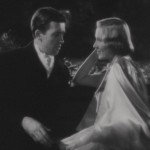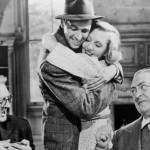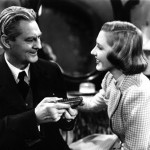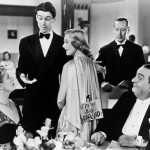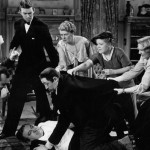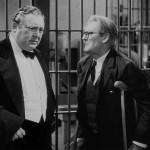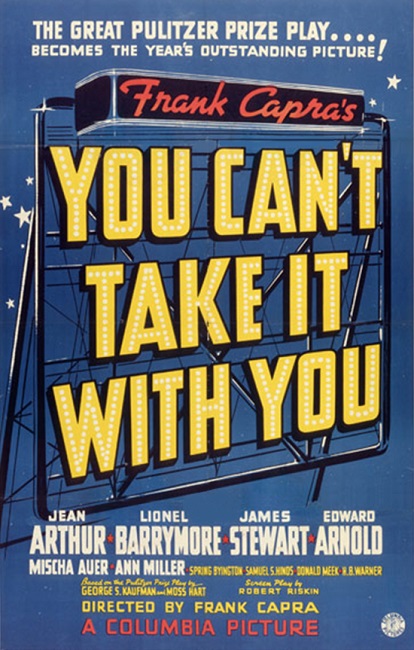
You Can’t Take It With You – 1938
You Can’t Take It With You clobbered me. It beat me over the head with a message… but I didn’t mind. The message of this Outstanding Picture winning movie was: There are things in life that are more important than money. It is a very true statement, to be sure, and at times the message was so blatant and unrepentant that it bordered on being preachy. But that being said, I really did enjoy the movie.
We’ll start off with the cast of actors. Jean Arthur as Alice Sycamore, our kooky female romantic lead, Lionel Barrymore as Grandpa Martin Vanderhof, Alice’s eccentric grandfather , Edward Arnold as Anthony Kirby, the stuffy business man, and a very young James Stewart as Tony Kirby, our other romantic lead. Barrymore did a particularly good job as the head of the Vanderhof/Sycamore/Carmichael clan. His character was very gentle, loveable, understanding, self-sacrificing, and charming, and yet human enough to lose his temper and really blow up at someone when driven to it. Barrymore brought all this out quite believably. Kudos to him.
Interesting note: Barrymore’s arthritic foot was written into the script as a sprained ankle, allowing the actor to be on crutches for the entire film.
And then, of course, James Stewart is always great to watch. He has a very easy on-screen presence. He seems to be completely comfortable in front of the cameras whether the situation is romantic, comedic, or dramatic. One curious thing about his character, though: James Stewart has a very slight southern drawl. You hear it in nearly every role he plays. It doesn’t matter that none of the other actors who play his family in the movie have this accent. But hey, it’s Jimmy Stewart, so I didn’t mind.
The movie is a feel-good movie. By the end of the film, you end up liking all the characters. You feel happy for all of them. The bad guys become good, the young couple in love can get married, and everyone becomes friends. And by the way… Did I mention that there are things in life that are more important than money?
The plot is a simple one. The son of a rich, stuffy, and ruthless business man falls in love with a girl from a poor, eccentric, and loveable family. Of course, the rich man wants to buy the poor man’s house, but the poor man cares nothing for money and will not sell. But when the love-birds bring the two families together, there is an awkward culture clash that has pretty funny results. As a matter of fact, I would even call this movie a zany comedy at times. But there were also profound dramatic moments that made you feel for characters from both families.
Something else that caught my attention is the fact that most romantic comedies are somewhat predictable. But this movie made me pause. At the climax of the film, I couldn’t easily tell which way the story would go, and that gave more weight to the drama. And did I mention that there are things in life that are more important than money?
Two supporting actors in the film who stood out to me were Spring Byington who played Alice’s mother, Penny Sycamore, and Dub Taylor who played Alice’s brother-in-law Ed Carmichael. Byington played a mother who loved being artistic in any way that took her fancy, but a few of her off-the-wall lines almost made her seem like a loveable air-head. Taylor’s character was an amusing country bumpkin. He is not particularly smart at times, but he is a good-hearted guy who obviously loves his wife, played by a fifteen year old Ann Miller. He also plays a mean xylophone! They were both fun to watch.
This movie had a lot to offer. It had comedy, drama, romance, big name actors, a good message, and a story that left me smiling when it was all over. It was definitely worthy of the Outstanding Picture Award.
Interesting note: In 1938 the country was still coming out of the Great Depression. The message of the movie was probably very appealing to a lot of audiences. There are indeed things in life that are more important than money.
